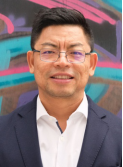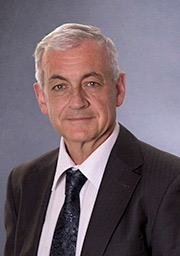Speakers
Keynote Speaker I

Prof. Tom Wu
School of Materials Science and Engineering, UNSW Australia
Speech Title: Heterostructured “Binary Materials” for Photodetection from Mid-Infrared, Visible, to X-ray
Abstract:
Light-matter interaction is a long-lasting theme in condensed matter physics and optoelectronics. Light detection in different wavelength regimes is the foundation of a wide range of sensing, imaging, medical and surveillance technologies. In this talk I will discuss the use of transition-metal oxides, hybrid organo-metal perovskites and mixed-dimensional heterostructures with proper bandgaps and architectures to detect photons with different wavelengths. First, for visible light detection, we demonstrate that combining 3D hybrid perovskites with high-mobility 1D carbon nanotubes or 2D two-dimensional metal dichalcogenides significantly enhances charge transport and device performance. Second, we report a mid-infrared (up to 10 m) hybrid graphene photodetector enabled via coupling graphene with a narrow bandgap semiconductor Ti2O3. Finally, using epitaxial ferroelectric/semiconductor oxide junctions with a current-perpendicular-to-plane geometry, we achieve a new X-ray detector with colossal persistent X-ray-induced photoconductivity.
Bio:
Dr. Tom Wu received his B.S. degree from Zhejiang University in 1995 and Ph.D. degree from the University of Maryland, College Park in 2002. Before joining University of New South Wales (UNSW) in Sydney as a full professor, he worked as postdoc in Argonne National Laboratory in Chicago, assistant professor in Nanyang Technological University (NTU) Singapore, and associate professor in King Abdullah University of Science and Technology (KAUST). Dr. Wu has authored 240 peer-reviewed papers with over 11,000 citations and a H-index of 59 in the areas of oxide thin films, nanomaterials, and hybrid perovskites, with a focus on their electronic, magnetic and optical functionalities. His group has witnessed the career development of 14 PhD students and 25 postdocs. He also serves as an Associate Editor for ACS Applied Materials & Interfaces.
Keynote Speaker II

Prof. Eduardo Nebot
FIEEE, FTSE, Director Australian Centre for Field Robotics, University of Sydney
Speech Title: Autonomous System in industrial application and Urban environments
Abstract:
During the last 15 years, we have seen significant progress in many areas related to sensing, navigation, control, planning and machine learning. Fundamental research contributions in these areas have enabled the development and deployment of autonomous system in various domains such as mining, stevedoring, and agriculture to name a few. This keynote will present the fundamental problems that have been addressed to enable the successful deployment of robotic automation in industrial environments. It will also present current projects in the intelligent transport system (ITS) area and an overview of the fundamental research challenges facing future autonomous applications in more complex scenarios, such as urban vehicle automation. The ITS group is currently involved in the development new mobility technology capable of seamlessly interaction of autonomous machines and pedestrian. This keynote will address the use of Deep Learning (DL) and machine vision to design perception systems that provide real time segmentation, track pedestrian position and inference of intention. It will also address the aspect of performance validation DL vision segmentation algorithms when operating under different environmental conditions. These topics are part of a Smart City project. This presentation will include demonstration of the autonomous technology operating at the University of Sydney campus.
Bio:
Eduardo Mario Nebot received the Bachelor's degree in Electrical Engineering from the Universidad Nacional del Sur, (Argentina) and MS and PhD degrees from Colorado State University, USA. Fellow of IEEE and FTSE.
He is a Professor at the University of Sydney in the School of Aerospace, Mechanical and Mechatronic Engineering. He has been appointed as the Patrick Chair of Automatic and logistic in 2004 and he is the Director of the Australian Centre for Field Robotics.
Professor Nebot has a substantial track record in robotics and automation. He has published more than 300 Referee Conference and Journal publications and given a large number of keynotes and industrial presentations. The major impact of his fundamental research is in autonomous system, navigation, mining safety and Intelligent Transport Systems.
Over the past 15 years, he has managed a large number industrial collaboration research projects in the area of Field Robotics. His fundamental research contributions are having a significant impact in the profession. They are already part of new key autonomous technologies deployed in various industrial environments such as mining, stevedoring, cargo handling and urban road vehicles. He is currently leading various collaborative research projects in autonomous urban vehicles with University of Michigan, Ford Motor Company USA, Renault France and Transport for New South Wales (TfNSW) among others. His research group is having an active role in the development and demonstration of new innovative technology in the intelligent transport area involving smart vehicles.
